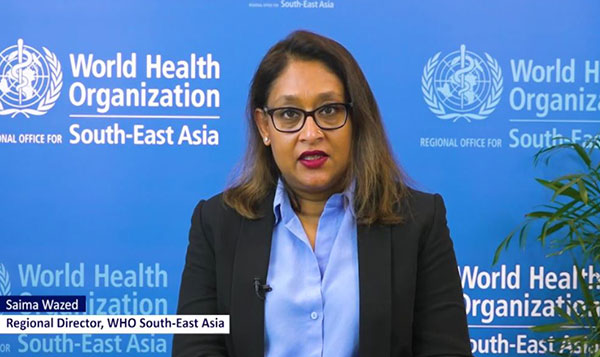
New Delhi: WHO Regional Director for South-East Asia Saima Wazed Thursday said more than 60 per cent of people with diabetes in the region are unaware of it and stressed the need for awareness about the condition through campaigns aimed at a healthy lifestyle. She said the care services need to be equitable, comprehensive, accessible, and affordable and underlined that bridging the service gap to ensure timely access to diabetes care can save lives.
“In our region, less than one in three adults with diabetes are on treatment and less than 15 per cent of people living with the condition have it under control.
“The lack of readiness in our primary healthcare systems in terms of standard management protocol, availability of essential medicines, issues related to availability and affordability of quality diagnostics, and trained healthcare professionals need to be remedied immediately,” the WHO regional director said.
On the occasion of World Diabetes Day, being observed this year with the theme “Breaking Barriers, Bridging Gaps”, Wazed said, “It serves as a reminder to all of us of the need to collectively work to overcome the growing burden of diabetes globally and in WHO South-East Asia Region.”
The theme emphasizes the importance of tackling the challenges faced by individuals, communities, and health systems to access diabetes prevention and management, she said.
Estimates for 2022 indicate that diabetes affects nearly 246 million people in the WHO South-East Asia Region.
Wazed said, “More than 60 per cent of people with diabetes in the region are unaware of their status.”
People need to be made aware of the prevention, detection and management of diabetes through awareness drives integrated with campaigns aimed at healthy lifestyles and those targeted at maternal, child and adolescent health, she said.
The outcomes of untreated and uncontrolled diabetes range from heart attacks, strokes, kidney failure, blindness and amputations, the WHO regional director said, adding these complications not only impose an emotional and financial burden on individuals and families but also a significant strain on healthcare systems.
She asserted that the prevention of diabetes risk factors needs an enabling environment.
The policy and programmatic initiatives of countries in the WHO South-East Asia region to address tobacco control, obesity, trans fatty acid elimination and physical inactivity are positive steps and are being identified as good practices globally.
“There is a further need to strengthen the integration of diabetes care into primary healthcare systems, including the implementation of the WHO HEARTS D technical package in the national context.
“Equipping primary health care with essential medicines and diagnostics including HbA1c testing, robust systems for monitoring the diabetes outcomes, and integration of diabetes services with infectious diseases like tuberculosis to mutually benefit both TB and NCD programmes,” Wazed said.













